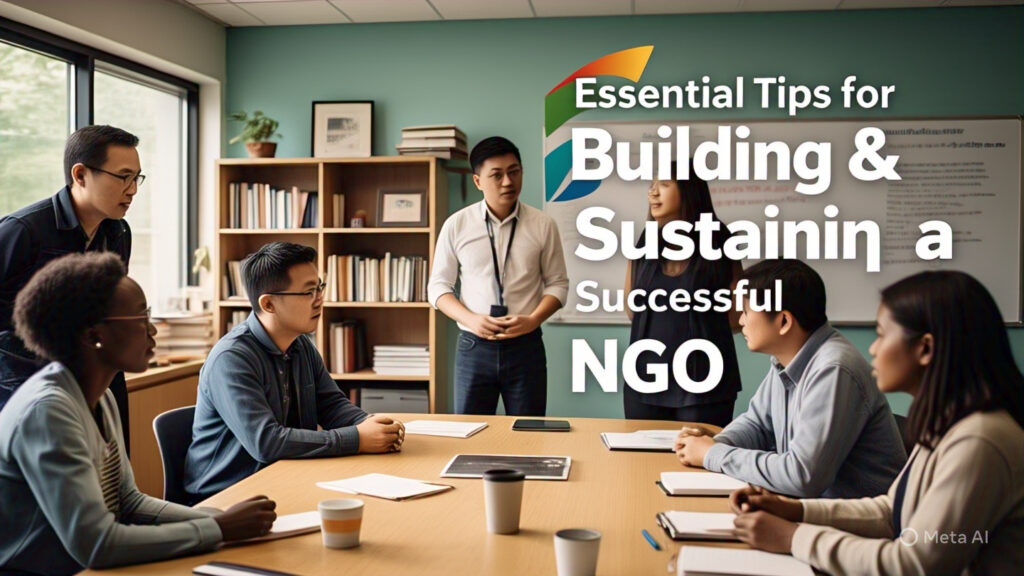
In a world grappling with complex challenges – poverty, inequality, climate crisis, conflict, and systemic injustice – Non-Governmental Organizations (NGOs) stand as vital catalysts for change. They fill gaps, amplify marginalized voices, pioneer innovative solutions, and hold power to account. Yet, the path to creating and sustaining a truly successful NGO is fraught with challenges. Success isn’t merely defined by survival or size; it hinges on demonstrable impact, organizational resilience, ethical integrity, and the ability to adapt in a dynamic landscape. This article distills essential tips to guide your NGO from passionate inception towards enduring, transformative success.
1. Foundational Clarity: Mission, Vision, Values – Your North Star
- Articulate with Precision: Your mission statement is your DNA – a concise, compelling declaration of why you exist and what fundamental problem you aim to solve. Avoid jargon.
- Envision the Future: Your vision statement paints the picture of the world you are striving to create – the long-term, aspirational change resulting from your mission’s fulfillment. It should inspire and provide direction.
- Embed Core Values: Define the non-negotiable principles governing how you work. Is it integrity, transparency, inclusivity, collaboration, innovation, accountability to beneficiaries? These values must permeate every aspect of the organization – from board recruitment to program design to staff conduct.
- Live and Breathe Them: Don’t let these statements gather dust. Use them to evaluate every strategic decision, partnership opportunity, program initiative, and hiring choice. They are your compass.
2. Robust Governance: The Bedrock of Accountability & Sustainability
- Build a Strategic Board: Recruit a diverse, skilled, and committed Board of Directors/Trustees. Look beyond networks for expertise in finance, law, fundraising, your sector, governance, and crucially, beneficiaries’ perspectives. Avoid “rubber-stamp” boards.
- Define Clear Roles & Responsibilities: Establish unambiguous charters differentiating the Board’s governance and oversight role (setting strategy, ensuring compliance, fiduciary duty) from the Executive Director/CEO’s operational management role. Prevent micromanagement.
- Prioritize Transparency & Accountability: Implement rigorous financial controls, regular independent audits, and clear reporting mechanisms (internally and externally). Be transparent with stakeholders (donors, beneficiaries, public) about successes, failures, and resource use. Accountability starts upwards to beneficiaries.
- Effective Board Engagement: Ensure regular, well-structured board meetings focused on strategy, impact, risk management, and governance – not just operational updates. Invest in board orientation, training, and evaluation.
3. Strategic Planning: Charting the Course with Purpose
- From Vision to Action: Translate your mission and vision into a concrete strategic plan (typically 3-5 years).
- Situational Analysis (SWOT/PESTLE): Conduct a thorough analysis of your Strengths, Weaknesses, Opportunities, and Threats (SWOT), alongside Political, Economic, Social, Technological, Legal, and Environmental (PESTLE) factors affecting your work.
- Set SMART Goals & Objectives: Objectives should be Specific, Measurable, Achievable, Relevant, and Time-bound.
- Resource Alignment: Ensure your plan realistically reflects your financial, human, and operational capacity. Prioritize ruthlessly – you cannot do everything. Link budgets directly to strategic objectives.
- Regular Review & Adaptation: Review progress against the plan quarterly and annually. Be prepared to adapt strategies based on changing contexts, new evidence, and lessons learned. Agility is key.
4. Financial Health & Diversification: Fueling Sustainable Impact
- Diversify, Diversify, Diversify: Over-reliance on a single donor or funding stream is existential risk. Actively cultivate a mix:
- Institutional Donors: Grants from foundations, governments, multilateral agencies.
- Individual Giving: Monthly donors, major gifts, online fundraising, legacy giving (build relationships!).
- Corporate Partnerships: Sponsorships, cause-related marketing, employee engagement (ensure ethical alignment).
- Earned Income: Social enterprises, fee-for-service (where appropriate and mission-aligned).
- Membership Fees/Community Support.
- Master Financial Management: Implement robust accounting systems, budgeting processes, and cash flow forecasting. Ensure timely and accurate financial reporting.
- Invest in Fundraising Capacity: Dedicate resources (staff, training, tools) to professional fundraising. It’s not an afterthought; it’s core to sustainability. Build authentic, long-term relationships with donors based on impact and transparency.
- Demystify & Defend Overhead: Educate donors that core administrative and fundraising costs (rent, accounting systems, skilled staff, fundraising efforts) are essential investments for effectiveness and sustainability, not “waste.” Advocate for full-cost funding.
5. Operational Excellence: Efficiency, Compliance & Risk Management
- Streamline Systems & Processes: Develop efficient workflows for finance, HR, program management, reporting, and communications. Leverage appropriate technology (CRMs, project management software, cloud accounting) to reduce admin burden and improve data management.
- Ensure Legal & Regulatory Compliance: Understand and meticulously adhere to all registration, reporting, tax, and operational requirements in every country/region you operate. Seek expert legal counsel.
- Proactive Risk Management: Identify potential risks (operational, financial, reputational, security, programmatic, safeguarding) and develop mitigation and contingency plans. Regularly review and update. Have crisis communication protocols.
6. People Power: Cultivating a Valued & Effective Team
- Strategic Recruitment & Retention: Hire mission-aligned talent with the right skills and cultural fit. Offer competitive (within sector constraints) and fair compensation, clear career pathways, and professional development opportunities. High turnover cripples impact.
- Invest in Capacity Building: Provide ongoing training for staff and volunteers in technical skills, project management, leadership, safeguarding, and well-being. Empower them.
- Foster a Positive Culture: Create a work environment based on respect, trust, collaboration, psychological safety, and recognition. Address burnout proactively. Strong internal communication is vital.
- Engage & Manage Volunteers Effectively: Treat volunteers as valuable assets. Have clear roles, provide training and support, recognize contributions, and integrate them meaningfully.
- Strong Leadership: The Executive Director/CEO must embody the mission and values, provide strategic direction, inspire the team, manage effectively, and be the organization’s key external representative.
7. The Power of Partnerships: Collaboration over Competition
- Identify Strategic Allies: Collaborate with other NGOs (local and international), community-based organizations, government agencies, academia, and the private sector where goals align. Avoid duplication, leverage complementary strengths, and amplify impact.
- Prioritize Local Ownership: Center the voices and leadership of the communities you serve. Partner with them, not just for them. Build capacity of local organizations.
- Establish Clear MOUs: Formalize partnerships with Memoranda of Understanding outlining roles, responsibilities, resource commitments, communication protocols, and decision-making processes.
- Focus on Mutuality: Ensure partnerships are based on mutual respect, transparency, and shared learning. Manage expectations proactively.
8. Compelling Communication & Storytelling: Building Trust & Engagement
- Know Your Audiences: Tailor messages for different stakeholders: beneficiaries, donors, policymakers, the media, the public. Understand their needs and interests.
- Impact-Focused Storytelling: Move beyond activities to showcase tangible impact and change. Use compelling human stories (with informed consent and dignity), combined with clear data and evidence. Show the “why.”
- Transparency as Default: Communicate openly about your work, finances (publish annual reports), challenges, and lessons learned. Build trust through honesty.
- Leverage Digital & Traditional Channels: Utilize a user-friendly website, email newsletters, social media effectively, and traditional media where relevant. Engage in two-way communication – listen and respond.
- Consistent Brand Identity: Ensure your visual identity and messaging consistently reflect your mission and values across all platforms.
9. Embrace Learning, Adaptation & Innovation
- Bake in Monitoring & Evaluation (M&E): Integrate M&E from the start of program design, not as an add-on. Use frameworks like Theory of Change or Logframes to map pathways to impact.
- Adapt Based on Evidence: Use M&E findings and contextual changes to refine programs, shift strategies, and innovate. Be willing to pivot or stop programs that aren’t working.
- Foster Innovation: Encourage creative thinking and experimentation to find new, more effective solutions to entrenched problems. Learn from others in and outside your sector.
10. Plan for Long-Term Sustainability Beyond Funding
- Build Endogenous Capacity: Invest in strengthening the skills, systems, and leadership within the organization and the communities you serve. Avoid creating dependency.
- Develop Strong Local Roots & Relevance: Ensure your work is deeply connected to and responsive to local contexts, needs, and priorities. Build trust and legitimacy within communities.
- Advocate for policy changes and shifts in societal attitudes.
- Cultivate Resilience: Build organizational structures and a culture that can withstand shocks – funding cuts, political changes, natural disasters, pandemics. Diversification and strong reserves are part of this.
Conclusion: The Journey, Not Just the Destination
Building a successful NGO is not a sprint; it’s a demanding, complex, and deeply rewarding marathon.
Shrimati Anitadevi Foundation is the Ngo for Food Donation & Best Ngo in Delhi that helps and donate food to people in need. Education: We help children and adults get education by providing learning resources. Cloth Distribution: We give clothes to people who need them. Group Marriages: We organize weddings for couples who can’t afford the costs. We offer a platform to donate food, medicines, wheelchairs, and support for the blind and handicapped. Shrimati Anitadevi Foundation is here to support and improve lives by helping communities in need.
Did you know millions of people go hungry every day? You can make a difference by donating food to those in need. Join the movement—share your food donation stories, discover local charities, and inspire others to give back. Together, we can create a world where no one sleeps on an empty stomach.
It requires unwavering commitment to your mission, grounded in strong values. It demands disciplined governance, strategic foresight, and financial prudence. Crucially, it necessitates humility, a relentless commitment to learning, and the courage to adapt.
The most successful NGOs are those that remain deeply rooted in their purpose, fiercely accountable to the communities they serve, strategically agile, and financially resilient. They understand that true success is a continuous journey of learning, adaptation, and unwavering commitment to creating a more just and equitable world. By embracing these tips, your NGO can navigate the complexities and maximize its potential to be a powerful force for enduring positive change.







